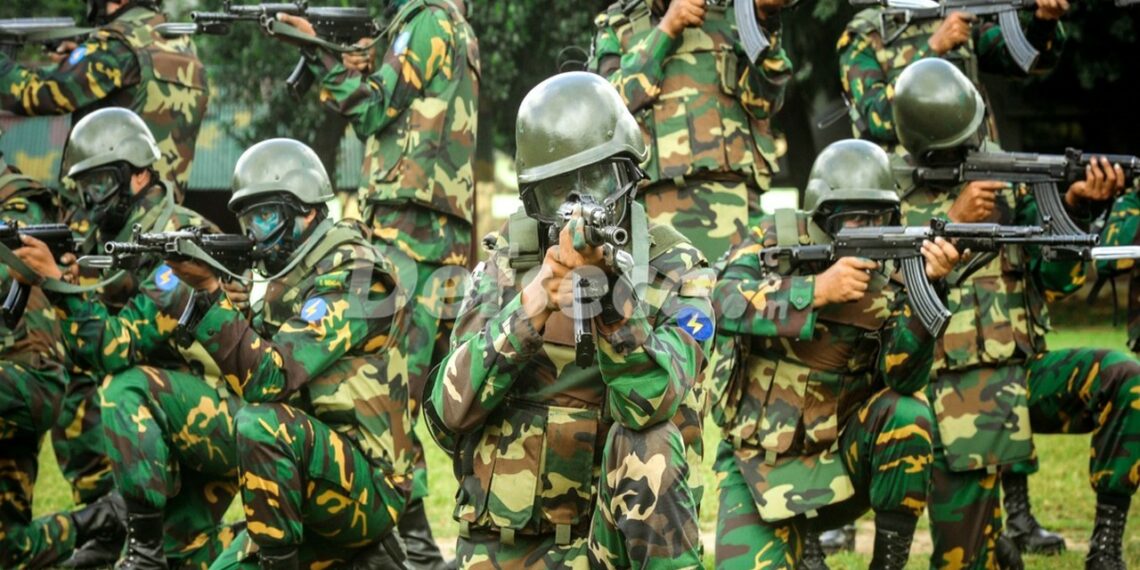Dressed in an immaculately cut dark blue suit and a silver tie, Bangladesh Army chief General S M Shafiuddin Ahmed quickly got off his chauffeur-driven staff car and hurried towards the stage where he was to give away awards for the best golfers among army officers, both serving and retired, at the Dhaka Army Golf Club on December 31 evening.
Gen Ahmed, who was to reach the club at 8 pm (BST), was delayed by half-an-hour. After the exchange of pleasantries, he was ushered onto the stage by a few retired army officers and club office-bearers. With the army band behind him, Gen Ahmed gave away the prizes but not before extending New Year greetings to the club members and the gathering. He then left, as hurriedly as he had made his entry.
“He smiled alright but he was not his usual self. He appeared tense,” an army veteran – a former Major General – told Northeast News.
The reason for Gen Ahmed’s late arrival at the Army Golf Club, rather unusual for an army officer punctual to a fault, was the nearly two-hour-long deliberations that he had with the rest of the top-brass, including newly-appointed Chief of Staff Lieutenant General Waker-uz-Zaman and Lt Gen Mizanur Rahman Shameem, the Personal Staff Officer, Armed Forces Division, in the Prime Minister’s Office.
While Lt Gen Waker-uz-Zaman was PSO, AFD before taking up his new assignment, Lt Gen Shameem commanded the crucial Savar-based 9th Infantry Division before he was moved to replace the former. Both officers, besides seven others in the ranks of Major General and Brigadier General, were, curiously, reshuffled on December 29, the day that troops from ten infantry divisions and a few other units were to be deployed across Bangladesh in view of the January 7 elections.
The same day, the Sheikh Hasina regime issued orders that the army would be deployed for election duties on January 3 – a decision that raised eyebrows across Bangladesh’s corridors of power in general and certainly the military in particular.
Whispers turned to murmurs which in turn took no time to spread thick and fast, prompting responsible officials to conclude – accurately – that most of the General Officers Commanding (GOCs) the ten divisions were not in favour of being deployed for an election that is increasingly being viewed as controversial in the least and fraudulent at the most.
The ten GOCs, all influential, if not powerful, Major Generals, had earlier gathered for a meeting led by Gen Ahmed on December 25. Nearly half the Major Generals had expressed their disapproval to their respective unit’s deployment. The reason: they did not want to be targeted by American punitive measures and/or sanctions for being part of an election process that goes against the basic tenets of electoral democracy as practiced in countries where rule of law is supreme.
The government sought to pass off the reshuffling as “routine” but the Major Generals had made their point quite boldly and unequivocally. And they would not budge. This was made amply clear to Gen Ahmed when he met them on New Year’s Eve – just three days before their respective units are to take up position across the country.
The GOCs fear that their units’ deployment would invite American punitive action ranging from visa restrictions to discontinuation of UN peacekeeping tours which fetch handsome pecuniary benefits to Bangladeshi soldiers, including officers and troops. Any American measure that could potentially cut off such benefits could cause a backlash among the soldiers who might resort to violent means to protect such tax-free perks.
The ruling Awami League regime on its part wants the army deployment. According to a December 24 order issued by the PMO’s Armed Forces Division (Operations and Planning Unit), the army units would be deployed for the elections “In Aid to the Civil Power” from January 3 to 10. The order was issued following an official, written request by the Election Commission.
It pointed out that the army would assist the civil authorities in consultation with and under instructions from the executive magistrates for safeguarding the law and order situation by:
- Remaining stationed at “nodal points” across all districts, sub-districts and police station areas.
- Coordinating with all the returning officers for their deployment in the districts, sub-districts and police station areas.
- Being part of teams that will act in coordination with the returning officers and executive magistrates and as per law and regulations.
- Acting in a coordinated manner for devising and finalising area-wise deployment plans.
- Taking action in accordance with actual events and necessity
While the AFD order suggested that army’s “recce teams” would fan out in the constituencies to ascertain and gather preliminary information on communication systems and electoral conditions, detailed instructions for the military units would be issued at a date closer to the election day.
Following the issuance of the order, a “coordination cell” within the AFD was established on December 29. It was also decided that all costs related to the army’s deployment would be borne by the Election Commission.















